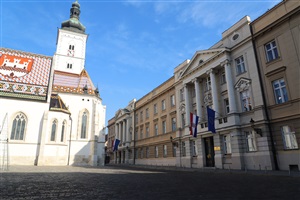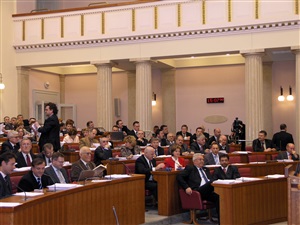 The Croatian Parliament has been a democratic, multiparty legislature since 1990.
The Croatian Parliament has been a democratic, multiparty legislature since 1990.
According to the 1990 Constitution, the Croatian Parliament may have a minimum of 100 and a maximum of 160 members, who are elected directly by secret ballot based on universal suffrage for a term of four years. Parliamentary terms of office are not binding, while members have legal immunity.
Currently the Croatian Parliament has 151 members who were elected on 17 April 2024. Their mandate began on 16 May 2024.
The first free, multiparty democratic elections were conducted in Croatia in the spring of 1990, and the democratic Croatian Parliament was constituted on May 30, 1990 based on the electoral results. In December 1990 a new Croatian Constitution was enacted. Under this Constitution, the Croatian Parliament consisted of the Chamber of Deputies and the Chamber of Counties.
Based on this Constitution, the Chamber of Deputies was constituted in 1992, while the Chamber of Counties was similarly constituted in 1993. Pursuant to constitutional amendments enacted in 2000, Croatia’s semi-presidential system of government was replaced with a parliamentary system, while further amendments enacted in March 2001 abolished the Chamber of Counties, so the Croatian Parliament became unicameral.
 The Croatian Parliament convenes regular sessions twice a year: the first session runs between 15 January and 15 July, while the second session runs from 15 September to 15 December.
The Croatian Parliament convenes regular sessions twice a year: the first session runs between 15 January and 15 July, while the second session runs from 15 September to 15 December.
The Croatian Parliament can also hold extraordinary sessions at the request of the Croatian President, the Government or a majority of parliamentary deputies. Extraordinary sessions may be convened by the Speaker of the Croatian Parliament after obtaining the prior opinion of the clubs of parliamentary parties.
The Parliament’s internal structure and operating methods are regulated by the Standing Orders, which are passed by a majority vote of all deputies.The Croatian Parliament decides on the enactment and amendment of the Constitution, enacts laws and the National Budget, declares war and proclaims peace, passes declarations that express the policies of the Croatian Parliament, adopts the national security and defense strategy for the Republic of Croatia, conducts civilian oversight of the armed forces and security services of the Republic of Croatia, decides on changes to the borders of the Republic of Croatia, calls referendums, and pursuant to the Constitution it elects, appoints and dismisses—and oversees the work of—the Croatian Government and other bodies vested with public authority accountable to the Croatian Parliament.
Parliament also grants amnesty in cases of criminal acts and engages in other activities as stipulated by the Constitution
The Croatian Parliament is authorised to make decisions if a majority of members are present at sessions, except in cases specified otherwise by the Constitutions of the Republic of Croatia or the Standing Orders. Sessions of the Croatian Parliament are public.
Besides plenary sessions, the work of the Croatian Parliament is also carried out by its working bodies, which are established in accordance with the Standing Orders of the Croatian Parliament.
The Croatian Parliament has its Speaker and one or several Deputy Speakers; according to the Standing Orders there can be from two to five deputy speakers. The Speaker and Deputy Speakers form the Presidency of Parliament. The Presidency accepts patronage on behalf of Parliament or its working bodies, confirms draft regulations on the public work of the Parliament and its working bodies, confirms draft decisions on the Parliamentary Staff Service, provides prior opinions on draft rules on the internal order of the Parliamentary Staff Service and performs other tasks stipulated by the Standing Orders.
The Presidency of Parliament, together with the chairmen of the parliamentary party clubs, deliberates on matters of importance to the Parliament’s work, encourages the placement of specific items on the agenda of Parliament and discusses other mattes pursuant to the provisions of the Standing Orders.
The Ombudsman is authorised by the Croatian Parliament to protect the constitutional and legal rights of citizens in proceedings before governmental administration and bodies vested with public authority. The Ombudsman is elected by the Croatian Parliament for a period of eight years.